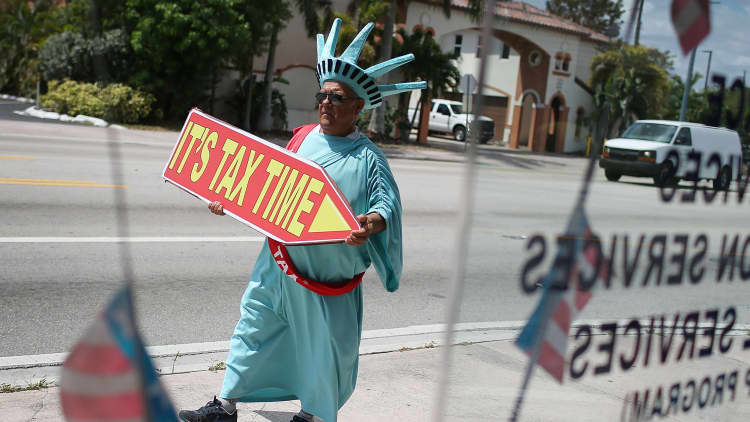
You may know less than you think you do about paying the tax man, according to NerdWallet.
The personal finance website quizzed 2,223 adults in January on their taxation know-how.
Filers' lack of knowledge could cost them big bucks in penalties and missed savings opportunities. For instance, 58 percent of surveyed individuals think that if they file for a tax extension beyond this year's April 18 deadline, they can hold off on paying any levies owed.
Wrong.
You're supposed to estimate the amount you owe and send the IRS a check by April 18. Anything Uncle Sam receives after that deadline will be subject to interest and penalties.
Here are a few other common taxpayer misunderstandings, according to the survey.
Withholding conundrum
Close to 60 percent of taxpayers have no idea what a W-4 is.
Here's a hint: It's a document you fill out so that your employer knows how much federal income tax to withhold from your paycheck.
Take a close look at this key form, because your input will determine whether you end up with a refund or a tax bill at the end of filing season. A major life change, such as a new job or marriage, will warrant a review of your W-4, but consider giving it a look every year.
"You should always look at your W-4 during open enrollment because you'll have the complete attention of your HR department," said Cari Weston, director of tax practice and ethics at the American Institute of Certified Public Accountants.
"Do it after you file your return," she said. "If you find yourself saying, 'Wow, I got way too much money back' or 'How will I pay this tax bill?' then it's a good time to revisit."
Bracket confusion
Many filers don't understand their income tax brackets, which are key to effective tax planning.
Four in 10 of the surveyed participants didn't know which bracket they fell into.
"For many people, brackets are theoretical," said Liz Weston, a certified financial planner and columnist with NerdWallet. "But if you're doing something for a tax break, you'll want to know how big that tax break is."
The correct bracket — or marginal tax rate — is especially important for individuals who itemize deductions, including charitable donations and mortgage interest. A deduction will lower your taxable income based on the bracket you are in.
You should know your bracket because it will give you a sense of the true value of a deduction.
For instance, a mortgage interest deduction is a lot less attractive if you're in a low bracket.
"If you're in the 10 to 15 percent income tax bracket, then the deduction isn't really helping you out," said Weston. "At best you may get back 10 to 15 cents on the dollar for a dollar of mortgage interest paid."
Let's say that you're in the 25 percent federal income tax bracket and you're in the 8 percent tax bracket for your state.
If you took out a 30-year mortgage for $200,000 at an interest rate of 4 percent, the mortgage interest tax deduction could save you about $3,000 in the first year of your homeownership, according to Bankrate's mortgage tax deduction calculator.
Points, the prepaid interest you pay to your lender at closing, and state tax rates also affect the amount you'll save.
Here's another example of how brackets can work: If your marginal tax rate is 15 percent or below, your qualified dividends are tax free.
Tax prep due diligence
Finally, more than half of the participants were either unsure or incorrectly believed that someone paid to prepare tax returns doesn't need a valid preparer tax identification number.
This number, which is issued by the IRS, is the bare minimum for tax pros, said Weston.
Applicants must provide their personal identification information, plus explanations for any felony convictions and details on any tax problem.
Other preparer qualifications include the Enrolled Agent and CPA. Enrolled Agents must pass a three-part IRS exam or have experience as an employee at the federal agency.
Meanwhile, CPAs must meet requirements for education and accounting experience, sit for a four-part exam and keep up with continuing education requirements.
"The preparer tax identification number is the most basic thing that you want," Weston said. "I want a professional to be at least an Enrolled Agent. If I have a more complicated return, a CPA might be the best."


